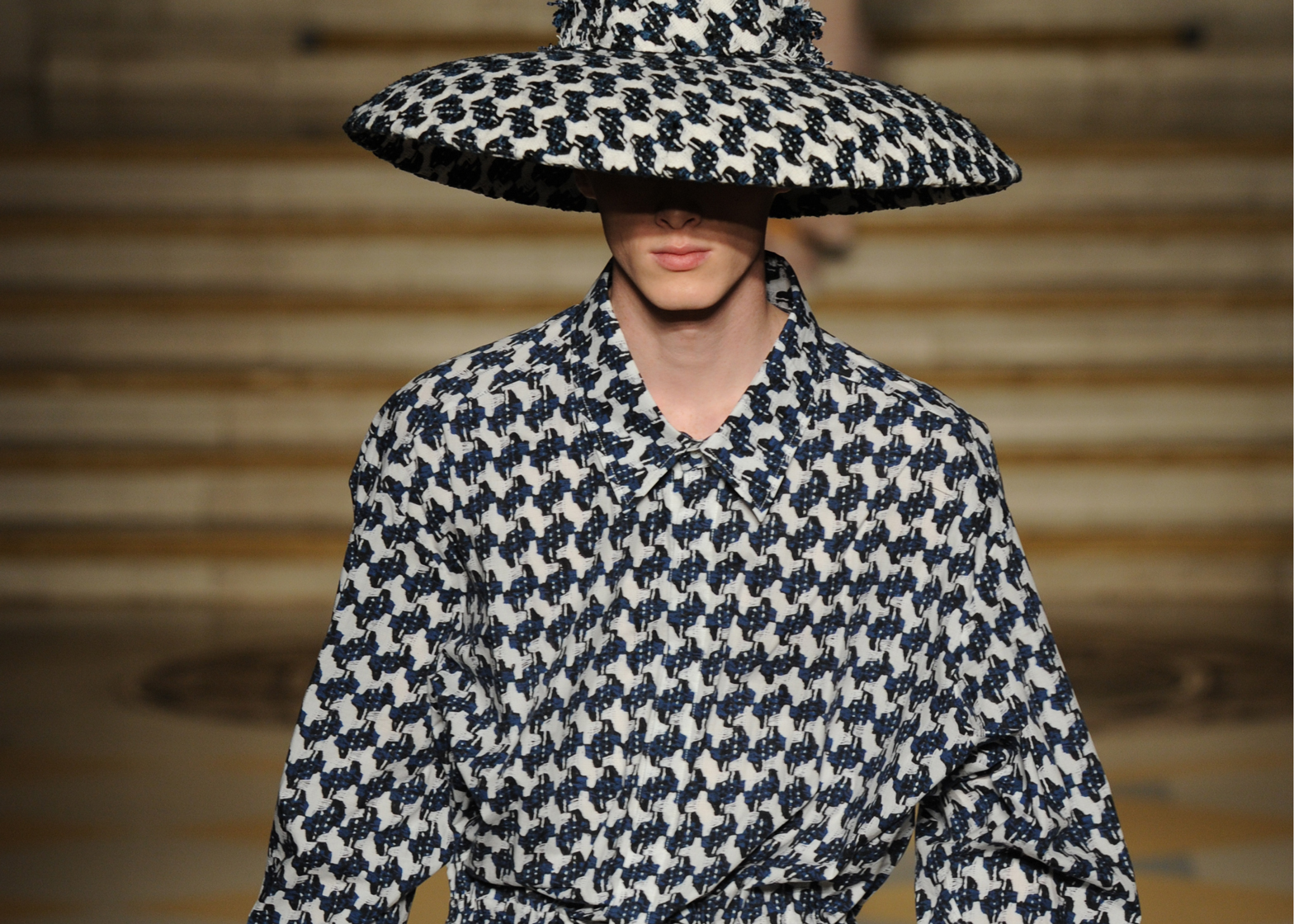Tudor-style ruffs, dismembered mannequin hands and recycled cardboard coats feature in Dezeen design editor Dan Howarth's pick of the MA Menswear graduate collections from London College of Fashion.
The LCF catwalk show took place today in the Art Deco-era Banking Hall venue, part of a protected building in the City of London that was formerly the headquarters for Lloyd's Banking. The show kicked off the eighth edition of the biannual London Collections Men fashion event.
Many of the LCF graduates showcased voluminous silhouettes, padded jackets and oversized knitwear, while others repurposed classic tailoring techniques to reinterpret both formal suits and wardrobe staples.
Although most of the items shown were more wearable than the conceptual designs presented by the institution's BA graduates last summer, the majority still challenged the boundaries of traditional menswear design.
London Collections Men Autumn Winter 2016 runs from 8 to 11 January 2016. See our picks from the LCF show below:
Jekeun Cho
Cho based his colourful collection on depression, particularly the suicide of comedian Robin Williams in 2014.
"Externally he looked perfectly happy, but there was definitely depression inside – totally the opposite," he told Dezeen after the show. "I tried to express that feeling."
The silhouettes of the jackets and coats feature extremely dropped shoulder seams, designed to suggest a hunched posture. In contrast, Cho used lurid colours and fuzzy spots to add a cheerful appearance to the garments.
"The colours are happy, but the silhouettes are depressed," he said. Two models also wore mannequins' hands over their mouths, as a metaphor for suffering in silence.
Grant-James Povey
The volume and details of Elizabethan dress provided the starting point for Grant-James Povey, who took references from English fashion between 1550 and 1610.
"I have quite an interest in history, so I decided to look at the appropriation of historical volume through a modern silhouette," he told Dezeen.
Povey aimed to modernise craft techniques from the period through his collection. These included smocking, an embroidery method used to gather fabric, and quilting, sewing together two layers of fabric with padding in between.
Bright red wool and cream satin were among the materials he used to create giant coats, ruffed shirts and frilled headgear.
"I chose colours that I thought were really rich and vibrant, and that would stand out against all the details," Povey said.
Xiaozhou Su
Su used her own life-drawing sketches of the male form to create subtle shapes across wool and cashmere suits, which are lined with silk – the same material as the matching shirts worn underneath.
"I wanted to create an illusion of a man on the man," she said. "If you wear the whole look, you will see a man's shape in the garments."
Each outfit features two bold contrasting colours in large blocks. The same hues were used for oddly shaped felt hats, leather gloves, socks and shoes.
"Usually men don't wear bright colours, so I wanted to break this boundary and see what would happen," Su said.
Models wearing Peng Chen's garments came out in giant quilted coats, which were removed to reveal patterned nightwear.
The designer mimicked 3D body scans to generate the desired silhouettes, which are intended to create the illusion of fatter wearers.
"My collection was based on comparing a large-size male and a small-size male," Chen told Dezeen. "Right now, the fashion trend is for the thinner man but in my design I wanted to celebrate the fat man."
He also created a range of large hats in collaboration with a milliner, some of which featured protruding horns. "For my hats, I got the inspiration from animal horns, like deers, because only male animals have horns," he said.
Partnering with British supermarket giant Tesco and the Vauxhall Foodbank, Beth Williams swapped food that had just passed its expiry date with unwanted items of clothing – mainly denim and knitwear. She used the fabrics gathered via this exchange to create her collection.
"Everything is handcrafted, including the knitwear, embroidery and weaving," Williams said.
All the garments are 100 per cent recycled, down to the zips and buttons. Coats are woven from strands of waste cardboard boxes from the supermarket, using a process that involves soaking the material, drying and fusing it to an organic cotton, before it is laser-cut and woven by hand.
She was given permission to print Tesco's branding for its low-cost Value range onto the garments. "I also donate 30 per cent of the production profit back to the food bank," she told Dezeen.

